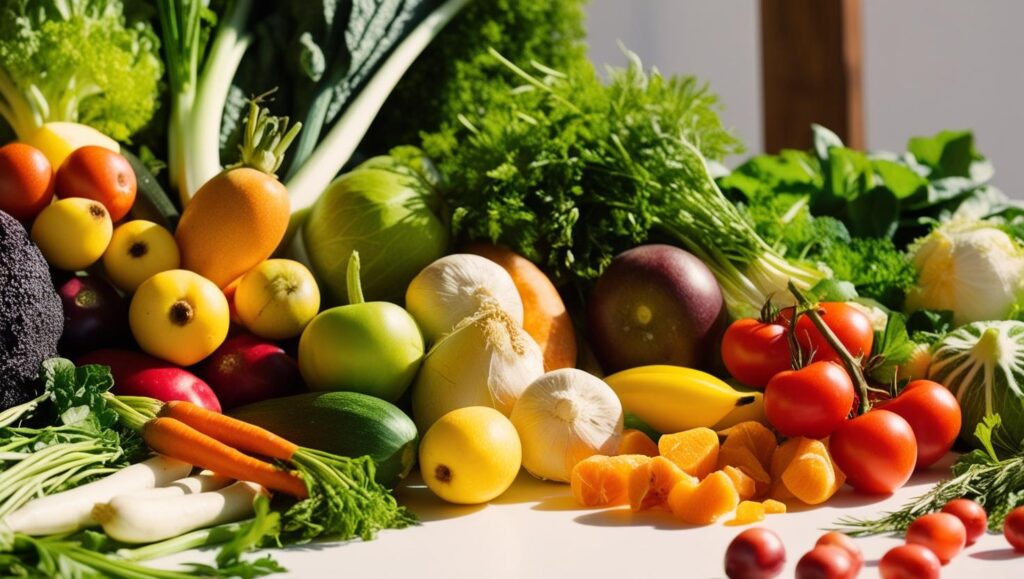Eating healthy isn’t just a trend; it’s a lifestyle choice that many health enthusiasts, home cooks, and organic food lovers are passionate about. If you’re striving for a vibrant, healthy life, sourcing the best organic raw ingredients is essential.
This blog post will guide you through the benefits, identification, sourcing, and incorporation of organic raw ingredients into your daily cooking. Whether you’re a seasoned chef or a home cook, this guide will enrich your understanding of what it means to eat clean and live well.
The Power of Organic Raw Ingredients
Organic raw ingredients are gaining popularity due to their undeniable benefits. These ingredients are free from synthetic pesticides and fertilizers, offering a cleaner and more natural alternative to conventional foods.
For those committed to a healthier lifestyle, understanding the importance of organic raw ingredients is crucial. They are not only beneficial for personal health but also for the environment and local economies.
The nutritional benefits of organic foods are significant. Studies suggest that organic produce contains higher levels of essential vitamins and antioxidants compared to their non-organic counterparts.
This boost in nutrients can enhance your overall well-being, support your immune system, and increase energy levels. Incorporating organic ingredients into your diet allows you to enjoy these benefits, making it an excellent choice for health enthusiasts.
Nutritional Benefits of Organic Ingredients
Consuming organic raw ingredients provides nutritional advantages that can significantly impact your health. Organic produce is often richer in vitamins and minerals, such as vitamin C, iron, and magnesium. These nutrients play a vital role in maintaining bodily functions, supporting the immune system, and promoting healthy growth and development.
Antioxidants are another key component of organic foods. They help combat oxidative stress, reducing the risk of chronic illnesses such as heart disease, cancer, and diabetes. By choosing organic, you not only eat delicious food but also support your body’s natural defenses against these diseases.
Additionally, organic farming practices enhance the nutritional content of soil, leading to healthier and more robust crops. Organic ingredients are grown without synthetic pesticides and fertilizers, allowing them to retain natural nutrients that can be lost in conventional farming methods. This makes organic food a powerful ally in your quest for a healthier lifestyle.
Environmental and Sustainable Sourcing
One of the primary reasons people choose organic is the positive environmental impact. Organic farming practices promote soil health, reduce pollution, and conserve water. This not only benefits the environment but also contributes to sustainable agriculture.
Organic farming relies on crop rotation, cover cropping, and composting to maintain soil fertility, preventing degradation and erosion. These practices support biodiversity and create a balanced ecosystem, providing habitats for various species and preserving natural resources.
Choosing organic ingredients also reduces reliance on fossil fuels and minimizes greenhouse gas emissions. By supporting organic farming, you are actively participating in the fight against climate change and promoting a healthier planet for future generations.

Supporting Local and Small-Scale Producers
When you source organic raw ingredients, you support local and small-scale producers who are dedicated to sustainable farming practices. Buying locally not only strengthens the economy but also fosters a sense of community and connection with the land.
Small-scale producers often prioritize quality over quantity, ensuring that their products meet high standards of freshness and taste. By purchasing their goods, you contribute to their livelihoods and help preserve traditional farming methods that prioritize environmental conservation and animal welfare.
Supporting local producers also reduces the carbon footprint associated with long-distance transportation. By choosing organic ingredients from nearby sources, you are making a positive impact on both the environment and local communities.
Identifying High-Quality Organic Ingredients
When shopping for organic ingredients, it’s essential to know what to look for to ensure you’re getting the best quality. Labels and certifications can help you identify genuine organic products and make informed choices.

Understanding Organic Certifications
 Organic certifications provide assurance that the products you purchase meet strict standards set by regulatory bodies. The USDA Organic seal, for example, indicates that a product is made with at least 95% organic ingredients and free from synthetic additives.
Organic certifications provide assurance that the products you purchase meet strict standards set by regulatory bodies. The USDA Organic seal, for example, indicates that a product is made with at least 95% organic ingredients and free from synthetic additives.
Other reputable certifications include the EU Organic logo, Canada Organic, and Australian Certified Organic. Familiarize yourself with these labels to confidently select organic products and avoid misleading claims.
In addition to certifications, look for products with transparent ingredient lists and minimal processing. This ensures that you are consuming whole, unadulterated foods that provide maximum nutritional benefits.
Seasonal and Local Sourcing Tips
 To source high-quality organic ingredients, consider the seasonality and locality of the produce. Seasonal produce is often fresher, more flavorful, and more affordable. It also supports sustainable agriculture by reducing the energy required for transportation and storage.
To source high-quality organic ingredients, consider the seasonality and locality of the produce. Seasonal produce is often fresher, more flavorful, and more affordable. It also supports sustainable agriculture by reducing the energy required for transportation and storage.
Visit local farmers’ markets or join a community-supported agriculture (CSA) program to access seasonal produce directly from growers. These venues offer an opportunity to meet farmers, learn about their practices, and discover new and exciting ingredients.
By prioritizing seasonal and local sourcing, you can enjoy a diverse range of organic ingredients throughout the year while supporting sustainable farming and local economies.
Farmers’ Markets
Farmers’ markets are a treasure trove of organic produce, providing a direct link between consumers and producers. These vibrant marketplaces offer an array of fresh fruits, vegetables, herbs, and other organic products that are often harvested just hours before the market opens.
At farmers’ markets, you can engage with growers, ask questions about their farming practices, and gain insights into the origins of your food. This transparency builds trust and allows you to make informed choices about the ingredients you bring into your kitchen.
Additionally, farmers’ markets foster a sense of community and connection, encouraging you to explore new flavors and support local agriculture.
Co-ops and Community-Supported Agriculture (CSA)
Co-ops and CSA programs are excellent sources for organic ingredients, offering a convenient way to access fresh, seasonal produce year-round. By joining a co-op or CSA, you become part of a community that values sustainable agriculture and supports local farmers.
Co-ops often prioritize organic and locally sourced products, providing a wide range of options for conscious consumers. They may also offer bulk buying opportunities, reducing packaging waste and saving you money.
CSA programs involve purchasing a share of a farm’s harvest, receiving regular deliveries of fresh produce throughout the growing season. This arrangement supports farmers financially and ensures you receive a diverse selection of organic ingredients to inspire your culinary creations.
Online Platforms and Specialty Stores
For those who prefer the convenience of online shopping, numerous platforms offer organic raw ingredients delivered straight to your door. Websites such as Thrive Market, Organic Direct, and FreshDirect provide a wide variety of organic products, from fresh produce to pantry staples.
Specialty stores like Whole Foods and Trader Joe’s also carry extensive selections of organic ingredients, catering to a range of dietary preferences and budgets. These stores often collaborate with local producers to offer unique and high-quality products that reflect the region’s flavors and traditions.
By exploring these options, you can access a diverse array of organic ingredients and enjoy the convenience of having them delivered to your doorstep.
Incorporating Organic Ingredients into Daily Cooking
Incorporating organic raw ingredients into your daily cooking routine can elevate your meals and enhance your well-being. With a few simple strategies, you can make the most of your organic finds and create delicious, nutritious dishes.
Tips for Meal Planning with Organic Ingredients
Meal planning is an effective way to maximize the use of organic ingredients and minimize food waste. Start by creating a weekly menu that highlights seasonal produce and incorporates a variety of whole foods.
When planning meals, consider using versatile ingredients that can be prepared in multiple ways. For example, a batch of roasted vegetables can be served as a side dish, tossed into a salad, or blended into a soup.
Batch cooking and meal prepping can also save time and streamline your cooking process. Spend a few hours each week preparing grains, proteins, and vegetables that can be mixed and matched to create balanced and satisfying meals.
Recipes and Meal Ideas
To spark your culinary creativity, here are a few recipe ideas that showcase the flavors and benefits of organic raw ingredients:
Organic Vegetable Stir-Fry
This vibrant stir-fry features a medley of seasonal vegetables, such as bell peppers, broccoli, and carrots, sautéed in a savory garlic and ginger sauce. Serve it over brown rice or quinoa for a nourishing and satisfying meal.
Quinoa Salad with Organic Greens
Toss cooked quinoa with a mix of organic greens, cherry tomatoes, cucumber slices, and avocado chunks. Drizzle with a simple lemon vinaigrette and sprinkle with toasted seeds for a refreshing and nutritious salad.
Vegan Berry Smoothie
Blend a handful of organic berries, such as strawberries, blueberries, and raspberries, with a banana, a scoop of plant-based yogurt (like almond or coconut yogurt), and a splash of almond milk. This smoothie is loaded with antioxidants and is a delicious option for breakfast or a post-workout boost.
Conclusion
Sourcing the best organic raw ingredients is a rewarding endeavor that benefits your health, the environment, and local communities. By understanding the importance of organic ingredients and knowing where to find them, you can elevate your cooking and enjoy the full spectrum of flavors and nutrients they offer.
We encourage you to incorporate more organic ingredients into your daily meals, experiment with new recipes, and share your experiences with fellow food enthusiasts. Together, we can create a vibrant community that celebrates the joys of organic cooking and inspires others to join the movement.












